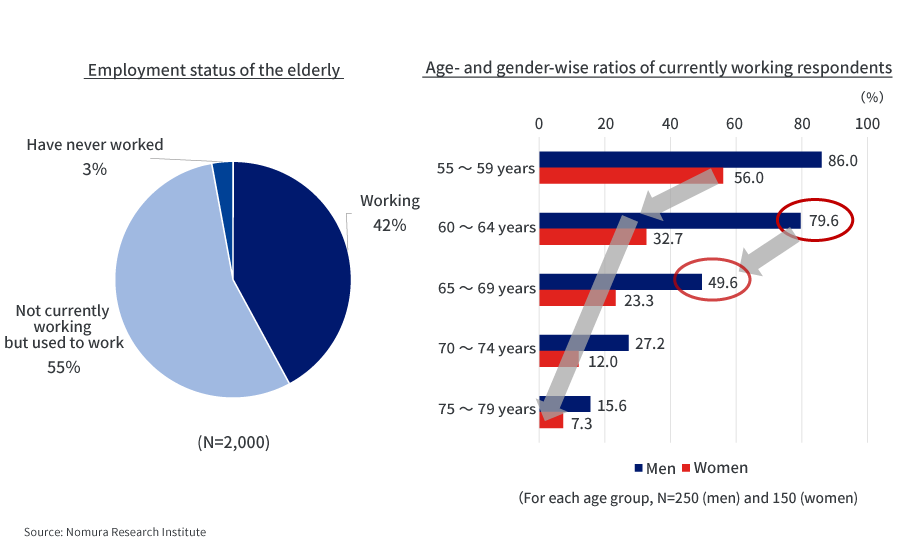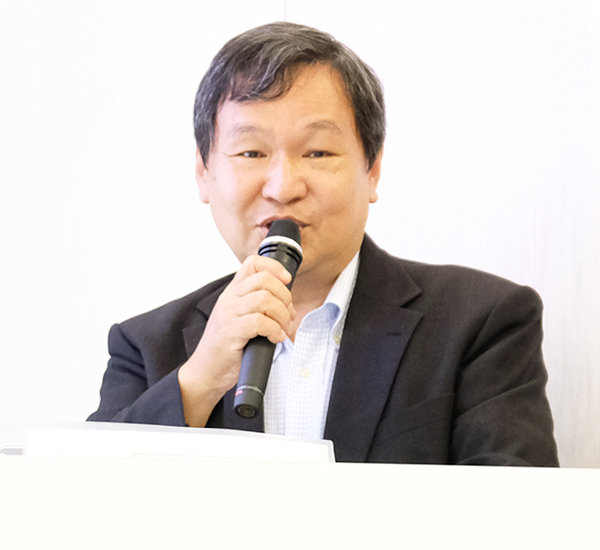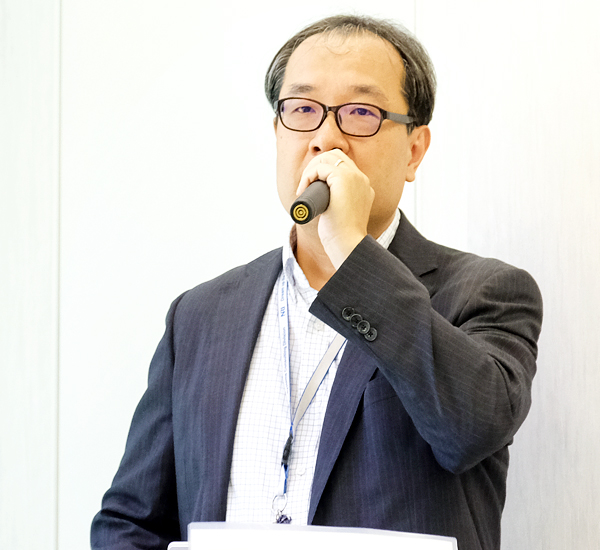Changes in the Employment Needs and Attitudes of the Elderly: An Information Base Supporting Diverse Working Styles
Oct. 03, 2019
NRI Social Information System Services, Ltd., a subsidiary of Nomura Research Institute (NRI), is helping revitalize the lives of the elderly as well as the local economy by providing operational systems to Silver Human Resource Centers (employment service centers for older people) across the country. The company has also been conducting a questionnaire survey for over 10 years on seniors’ willingness and attitudes to work. This article outlines the results of the survey conducted in FY 2019-20 on the topic, "Changes in the Employment Needs and Attitudes of the Elderly".
The age of 65 is the turning point for senior employment
The purpose of this survey was to understand the employment status, willingness to work, lifestyles, and values of the senior generation and to consider how to expand employment opportunities for them. The survey was conducted via the internet, with a total of 2,000 respondents from across the country. Each 5-year age bracket from age 55 to 79 consisted of 400 people (250 men and 150 women) respectively.
The first question for all respondents was on their employment status. 42% said they were "working" and 55% said they were "not currently working but used to work". By gender and age, 86% of males aged 55-59 years and 79.6% of males aged 60-64 years responded that they were "working," but there was a significant decline in the 65-69 age group, with only 49.6% responding so. On the other hand, the proportion of working women was seen to decline at an earlier age than men, with only 56% in the age group 55-59 and 32.7% in the age group 60-64 answering that they were “working”.

Takada points out, "The percentage of men working in their early 60s and late 60s differs greatly. In other words, men’s willingness to work changes significantly after the age of 65."
Need for a system that matches the diverse working styles demanded by the elderly
Another interesting result was that of active permanent employees aged 55-59 responding about their future willingness to work. Out of these respondents, 70.2% said that they would like to continue working as a permanent employee at the age of 60-64, and 46.2% would like to do so even at the age of 65-69. This is about the same as the percentage of respondents who would like to work as part-time or contractual employees. However, for employees aged 70-74, only 26.9% want to work as permanent employees. Instead, apart from part-time and contractual work, many of them want to find temporary or short-term jobs through organizations such as Silver Human Resource Centers and NPOs, or through the internet.
Takada stated that these survey results should be taken into consideration when discussing employment among the elderly.

"Currently, the government is considering extending the age of retirement to 70. While the demand to extend the retirement age to 65 is already gaining momentum, if we directly try to raise it to 70 years, there is a risk that it will not suit the needs of the elderly, who wish to work in diverse ways. It is necessary to identify the desired working styles of the elderly and consider their employment requirements in their late 60s and 70s."
Widespread information sharing is required to support the diverse working styles of the elderly

Based on the results of this survey, Komatsu points out that the basic issue regarding elderly employment is the complexity of diversification from the three perspectives of seniors’ willingness to work, employers’ issues, and the laws concerning employment. Each of these stakeholders lacks knowledge of particular issues: senior citizens don't know how to find jobs suitable for them, employers don't recognize the potential of senior human resources, and the employment system as a whole does not understand seniors’ requirements. This three-pronged mismatch has resulted in a situation where society as a whole is unable to efficiently meet the employment needs of the elderly.
"Many seniors went to Hello Work in search of work, but they couldn't find the jobs they wanted. However, there are many types of jobs that cannot be found at Hello Work but are available at Silver Human Resource Centers. Society is moving toward a mixture of employment support organizations for the elderly and IT-based skill-matching services led by private companies. Although it is certainly desirable for seniors to have more options when looking for jobs, it is imperative to ensure coordination in the dissemination of information, so that job openings and job applications are all available in one place. This is in line with the future vision envisioned by Society 5.0," said Komatsu.
With the labor shortage growing increasingly serious, the expectations from seniors are increasing. In line with this, the legal and employment systems have been improved and strengthened. However, we should pay more attention to the opinions of elderly workers and understand their diverse needs.







